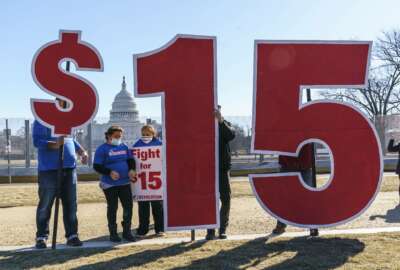The Biden administration has fended off a state-led challenge to an executive order that raised the minimum hourly wage for federal contractor employees.
A federal judge in Arizona ruled last Friday that the Biden administration was well within its authority to issue an executive order in April 2021 raising the minimum wage for federal contractor employees to $15 an hour.
The federal judge’s ruling upholds the Biden administration’s higher minimum wage for federal contractors nearly a year into its implementation. The Labor Department’s final rule that set the higher minimum wage went into effect on Jan. 30, 2022.
That minimum wage for federal contractor employees increased again to $16.20 per hour, as of Jan. 1, 2023, according to the Labor Department.
“The president here relied on a broad statutory delegation to exercise proprietary authority in an area — general administrative control of the executive branch — over which he enjoys inherent powers,” U.S. District Judge John Tuchi wrote in his Jan. 6 ruling.
Attorneys general for Arizona, Idaho, Indiana, Nebraska and South Carolina led the lawsuit, and unsuccessfully sought a preliminary injunction to block the new minimum wage for federal contractors from going into effect in April 2022.
Tuchi said the Biden administration executive order was well within the president’s authority under the Federal Property and Administrative Services Act, which allows the president to set policies considered necessary to promote the “economy and efficiency” of federal contracting.
The Labor Department argued that increasing the minimum wage for federal contractors would improve morale and productivity, while reducing employee turnover and absenteeism.
“Here, the president has rationally determined that increasing the minimum wages of contractors’ employees will lead to improvements in their productivity and the quality of their work, and thereby benefit the government’s contracting operations,” Tuchi wrote.
The Labor Department’s rule also applies to federal subcontractors. The Biden administration argued in court that applying the same minimum wage standard to subcontractors would “prevent government contractors from simply subcontracting out the bargained-for services to avoid paying the minimum wage.”
The Biden administration pushed back on the states’ claim that implementing a higher minimum wage will cause federal contractors to reduce staffing or forgo bids on upcoming federal contracts because of the minimum wage requirements, resulting in a drop in state tax revenue and an increase in state unemployment claims.
The judge also observed that the previous two presidential administrations issued executive orders on the minimum wage for federal contractors without any legal challenge.
Former President Barack Obama signed an executive order in April 2014 that increased the federal contractor minimum wage to $10.10 per hour.
Former President Donald Trump issued an executive order in May 2018 that exempted federal contractors that provide recreational services on federal lands from complying with the federal contractor minimum wage set in the Obama administration EO.
The plaintiffs also compared the burden federal contractors face complying with minimum wage requirements to a COVID-19 vaccine mandate that has been the subject of protracted legal battles.
A federal appeals court, in a 2-1 ruling, said Dec. 19 that the Biden administration could not enforce its vaccine mandate for federal contractors, according to reporting from Reuters.
However, the court dismissed the comparison, and said the administration’s federal minimum wage executive order and final rule “fit much more comfortably within the statutory goals of economy and efficiency as courts have broadly defined them.”
The Labor Department estimates approximately 327,000 employees will see an increase in wages in the first year of implementation, and will cost contractors $1.7 billion per year over 10 years — funds that contractors may deduct from their state taxable incomes.
The vaccine mandate, by contrast, would have affected up to one-fifth of the total U.S. workforce.
“There is a history of federal involvement in regulating wages, and further, the government here is setting minimum wages only for those workers connected to federal contracting,” Tuchi wrote.
The judge found the new, higher minimum wage created no greater burden on federal contractors under FPASA than, for example, President George W. Bush’s executive order requiring federal contractors to use the Department of Homeland Security’s E-Verify system to guarantee their employees’ eligibility to work in the U.S.
The Biden administration, however, still isn’t able to fully implement the new minimum wage.
The 10th Circuit Appeals Court in Colorado granted an injunction in February 2022 that prevents the federal government from enforcing the executive order on federal contracts “in connection with seasonal recreational services or seasonal recreational equipment rental for the general public on federal lands.”
Copyright
© 2024 Federal News Network. All rights reserved. This website is not intended for users located within the European Economic Area.
